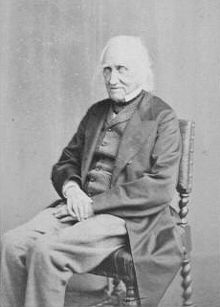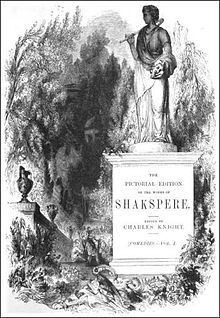- Charles Knight (publisher)
-
Charles Knight (15 March 1791–9 March 1873) was an English publisher and author.
Contents
Early life
The son of a bookseller and printer at Windsor, he was apprenticed to his father. On completion of his indentures he took up journalism and had an interest in several newspaper speculations, including the Windsor, Slough and Eton Express.
In 1823, in conjunction with friends he had made as publisher (1820–1821) of The Etonian, he started Knight's Quarterly Magazine, to which Winthrop Mackworth Praed, Derwent Coleridge and Thomas Macaulay contributed. It lasted for only six issues, but it made Knight's name as publisher and author, beginning a career which lasted over forty years. One of his early publications was the diary of the naval chaplain Henry Teonge (c. 1620-1690).[1]
Editor
In 1827 Knight was forced to give up publishing, and became the superintendent of the publications of the Society for the Diffusion of Useful Knowledge, for which he projected and edited The British Almanack and Companion, begun in 1828. In 1829 he resumed business on his own account with the publication of The Library of Entertaining Knowledge, writing several volumes of the series himself. In 1832 and 1833 he started The Penny Magazine and The Penny Cyclopaedia, both of which had a large circulation. The Penny Cyclopaedia, as a result of the heavy excise duty, was only completed in 1844 at a financial loss.
Besides many illustrated editions of standard works, including in 1842 an edition of the works of William Shakespeare entitled The Pictorial Shakspere, which had appeared in parts (1838–1841), Knight published a variety of illustrated works, such as Old England and The Land we Live in and The Pictorial Gallery of Arts - Useful Arts, the latter based on the Great Exhibition of 1851. He also undertook the series known as Weekly Volumes, himself contributing the first volume, a biography of William Caxton. Many famous books, Harriet Martineau's Tales, Anna Brownell Jameson's Early Italian Painters and G. H. Lewes's Biographical History of Philosophy, appeared for the first time in this series.
In 1853 Knight became editor of The English Cyclopaedia, essentially a revision of The Penny Cyclopaedia. Knight also launched the Local Government Chronicle in 1855, and at about the same time he began his Popular History of England (8 vols., 1856–1862). In 1864 he withdrew from the business of publisher, but he continued to write nearly to the close of his long life, publishing The Shadows of the Old Booksellers (1865), an autobiography under the title Passages of a Working Life during Half a Century (2 vols., 1864–1865), and an historical novel, Begg'd at Court (1867). He died at Addlestone, Surrey.
Legacy
Charles Knight is considered to be the first person to propose the use of stamped newspaper wrappers in 1834, so stands as their "inventor".[2][3]
References
- A. A. Clowes, Knight, a Sketch (1892);
- Francis Espinasse, in The Critic (May 1860).
Notes
- ^ The Diary of H. Teonge, Chaplain on board his Majesty’s Ships Assistance, Bristol, and Royal Oak Anno 1675 to 1679 ... With biographical and historical notes. London, 1825.
- ^ Smyth, Eleanor C, Sir Rowland Hill the Story of a Great Reform, 1907, p189
- ^ Dagnall, H, Postal Stationery Wrappers, 1993, p42
 This article incorporates text from a publication now in the public domain: Chisholm, Hugh, ed (1911). "Charles Knight". Encyclopædia Britannica (11th ed.). Cambridge University Press. http://www.1911encyclopedia.org/Charles_Knight.
This article incorporates text from a publication now in the public domain: Chisholm, Hugh, ed (1911). "Charles Knight". Encyclopædia Britannica (11th ed.). Cambridge University Press. http://www.1911encyclopedia.org/Charles_Knight.
External links
- An 1842 map distributed by the Society for the Diffusion of Useful Knowledge and published by Charles Knight, Central America. II. Including Texas, California, and the northern states of Mexico / J. & C. Walker, sculpt. hosted by the Portal to Texas History.
- Engravings from Charles Knight's books, including Picturesque Old England, are online at www.fromoldbooks.org together with some of the text.
Categories:- 1791 births
- 1873 deaths
- English book editors
- English journalists
Wikimedia Foundation. 2010.


